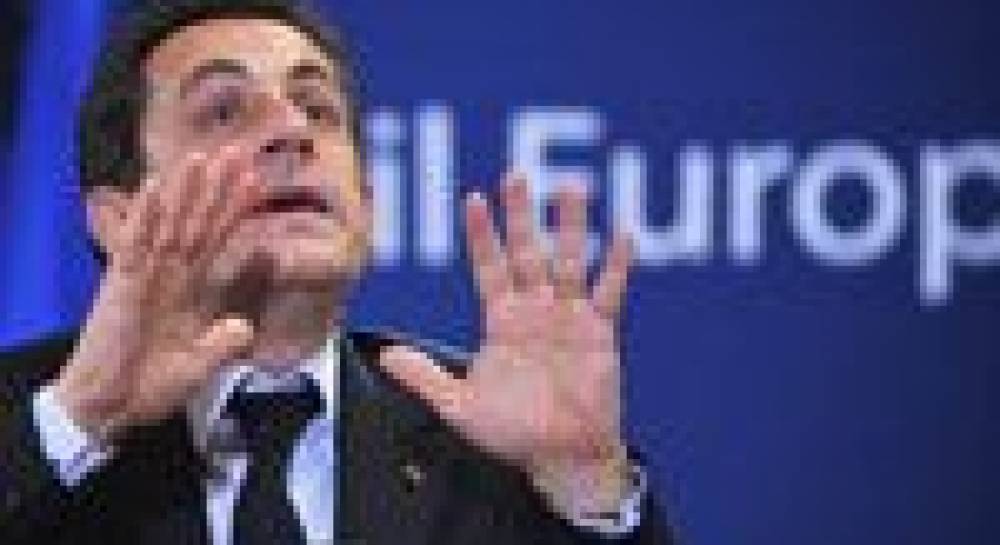
EU tugs at Ukraine amid concerns about Russia
The European Union is drawing a line in the sand with Russia: the bloc isn`t going to let Ukraine get dissected like Georgia was. The EU tugged Ukraine westward on Tuesday by launching a symbolic new accord, wading into Moscow`s backyard...
The European Union is drawing a line in the sand with Russia: the bloc isn`t going to let Ukraine get dissected like Georgia was.
The EU tugged Ukraine westward on Tuesday by launching a symbolic new accord, wading into Moscow`s backyard for a second straight day on fears that Russia is flexing its muscle among former Soviet states.
The 27-member bloc stopped short of offering Ukraine membership during an EU-Ukraine summit hosted by French President Nicolas Sarkozy. But the two sides began work on an "association accord" — a step that offers closer political and economic ties and in the past has been designed to prepare nations for eventual membership.
The summit was a potential boost for Ukraine`s pro-Western President Victor Yushchenko, who hailed the move. He has recently faced the unraveling of a political alliance that was behind his country`s Orange Revolution in 2004.
"The EU does a huge favor to Ukraine by inviting it into this accord. This shows that (the EU) cares," said Arkady Moshes, director of Russian program at the Finnish Institute of International Affairs, by phone.
"The EU wants to try at least to show Russia that the old sphere of influence is obsolete ... and that bringing the old Soviet borders back would not be accepted," he added.
The meeting came a day after Sarkozy, whose country now holds the rotating EU presidency, led a diplomatic push in Georgia and Russia to cement a cease-fire deal and soothe tensions between the two neighbors following last month`s war.
He won a commitment from Russian President Dmitry Medvedev to let EU monitors into parts of Georgia now occupied by Russian troops, and a timetable for a Russian pullback of some forces from key positions inside the Caucasus Mountains nation. They also set a date for international talks on security in the region.
Georgia amounts to a test case for a potentially more complex and consequential situation with Ukraine, which has historic ties to Russia and like Georgia has been signaling its hope to join the EU and NATO.
Ukraine`s population of about 45 million is nearly 10 times that of Georgia, and about one in six are ethnic Russians — and a political fracture between the Western-minded president and prime minister has given ethnic Russians more political clout in recent months.
The Kremlin has watched warily in recent years as Ukraine and other former Soviet republics have pressed for closer Western ties — and Moscow vehemently objects to their joining the Atlantic alliance.
Many Ukrainians fear that Moscow covets Ukraine`s strategic Crimea peninsula on the Black Sea, which is home to an ethnic Russian majority and is the site of a proud Russian naval base in the port of Sevastopol.
The head of the European Commission, Jose Manuel Barroso, said closer ties between Europe and Ukraine should not upset Russia.
"We don`t need a Cold War in Europe, we need cool heads," he said at a news conference after the Paris summit.
Sarkozy insisted that the EU`s overtures with its eastern neighbors "aren`t directed against anyone," but he also sought to cast Ukraine as part of the bloc`s orbit in the strongest terms yet.
"We say solemnly that Ukraine is a European country that shares a common history and values with European Union countries," he said.
However, French diplomatic officials have acknowledged that EU member countries are divided about how quickly to try to integrate Ukraine — if at all.
In a clear message to Moscow, Sarkozy said Ukraine`s borders are "perfectly nonnegotiable. And for that matter, nothing in the discussions we had yesterday in Moscow led me to believe there`s any question about them."
Russia`s intentions are clearly on many minds. "These aren`t the best of times to take on this dialogue," Yushchenko said.
The association accord launched Tuesday has three key objectives: freeing up travel restrictions to EU states for Ukrainians, pointing out that future ties remain "open" between Ukraine and the bloc, and emphasizing that the country shares a common history and values with Europe.
The accord isn`t likely to be signed until next year at the earliest. Its launch came with a call for deeper ties in foreign policy, military cooperation, and energy policy, among other issues.
For Sarkozy, the summit culminated a two-day focus on former Soviet states.
After marathon negotiations with Medvedev in Moscow on Monday, Sarkozy said that at one point he threatened to walk out of the talks.
When Medvedev stepped out of the negotiation room, the European delegation noticed that a draft of the text eliminated a reference to Russia pulling back its forces to positions held before Aug. 7, Sarkozy said.
With jacket in hand, Sarkozy threatened to leave, saying "we cannot accept the invasion of a countr," he said. At that point the Russians wheedled him back to the table and agreed to put that back in, he added, speaking to pool reporters on the flight from Moscow to the Georgian capital, Tbilisi.
The Finnish institute`s Moshes said both sides can claim a partial victory after Monday`s talks.
The EU helped cool tensions in its neighborhood, he said, while predicting the bloc will "acquiesce" to Russian recognition of independence of the breakaway Georgian regions of Abkhazia and South Ossetia.
The real question, though, he added, is whether the latest Sarkozy-brokered Russia-Georgia agreement will hold. "The EU is trying to do what it can; whether it will succeed is another matter."

